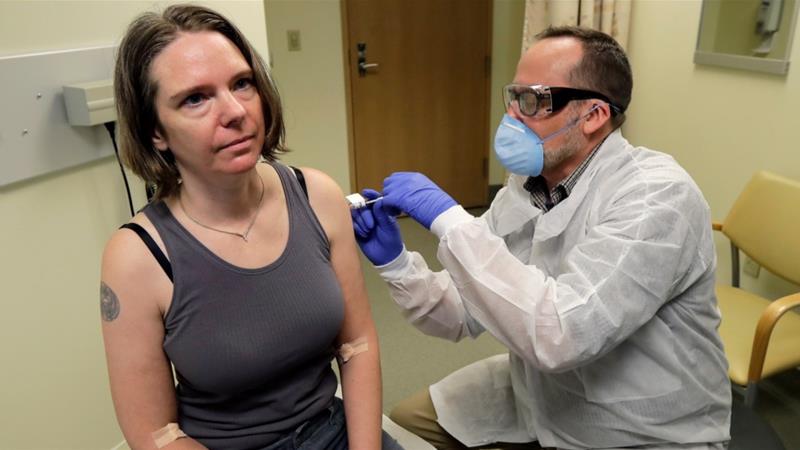World leaders and organizations have pledged $8bn to research, manufacture and distribute a possible vaccine and treatments for COVID-19, but the United States has refused to contribute to the global effort.
Organizers included the European Union and non-EU countries the United Kingdom, Norway and Saudi Arabia.
Leaders from Japan, Canada, South Africa and dozens of other countries joined the virtual event on Monday, while China, where the virus is believed to have originated, was only represented by its ambassador to the EU.
Governments aim to continue raising funds for several weeks or months, building on efforts by the World Bank, the Bill and Melinda Gates Foundation and wealthy individuals, and to turn the page on the fractious and haphazard initial response to the pandemic around the world.
“In the space of just [a] few hours we, have collectively pledged 7.4 billion euros ($8.1bn) for [a] vaccine, diagnostics and treatment” against COVID-19, the head of the European Commission, Ursula von der Leyen, said after chairing the online event.
“This will help kick-start unprecedented global cooperation,” she added.
It was however unclear what was new funding, as commitments made earlier this year may also be included, EU officials said.
Donors included pop singer Madonna, who pledged one million euros ($1.08m), von der Leyen said.
British Prime Minister Boris Johnson, who has recovered from a life-threatening battle with COVID-19, said the search for a vaccine was “the most urgent shared endeavour of our lifetime”, calling for “an impregnable shield around all our people”.
EU diplomats said the US, which has the world’s most confirmed COVID-19 cases, was not taking part.
A senior US administration official declined to say specifically why the US was not participating.
“We support this pledging effort by the EU. It is one of many pledging efforts that are going on and the United States is at the forefront,” the official told reporters by telephone.
President Donald Trump last month said he would halt funding to the World Health Organization (WHO), whose director-general addressed the conference, over its handling of the pandemic.
Norwegian Prime Minister Erna Solberg said she regretted that decision, as well as Washington’s absence on Monday.
“It is a pity the US is not a part of it. When you are in a crisis, you manage it and you do it jointly with others,” Solberg told Reuters News Agency in an interview, pledging $1bn to support the distribution of any vaccine developed against COVID-19, and for vaccines against other diseases.
“We’ve had several discussions with our American partners and I’m convinced the Americans will eventually commit to this dynamic because it’s the way forward for the world,” French President Emmanuel Macron said.
Global reach
Many leaders stressed that any vaccine must be available to everyone. Canadian Prime Minister Justin Trudeau said it should not just be for rich countries.
“Those who invent it of course will be fairly paid, but access will be given to people across the globe by the organization we choose,” Macron said.
EU officials said pharmaceutical companies that receive the funding will not be asked to forgo intellectual property rights on the new vaccine and treatments, but they should commit to making them available worldwide at affordable prices.
The $8bn-goal was in line with expectations but is only an initial figure. Von der Leyen has said more money will be needed over time.
The Global Preparedness Monitoring Board, a UN-backed body focusing on health crises, estimates that of the $8bn immediately needed, $3bn will have to be spent to develop, manufacture and distribute a possible vaccine against COVID-19, the EU Commission said.
Another $2.25bn is needed to develop treatments for COVID-19, $750m for testing kits, and another $750m to stockpile protective equipment, such as face masks. The remaining $1.25bn would go to the WHO to support the most vulnerable countries.
The UK will hold an online donor summit on June 4 for GAVI, the Global Alliance for Vaccines and Immunizations.













